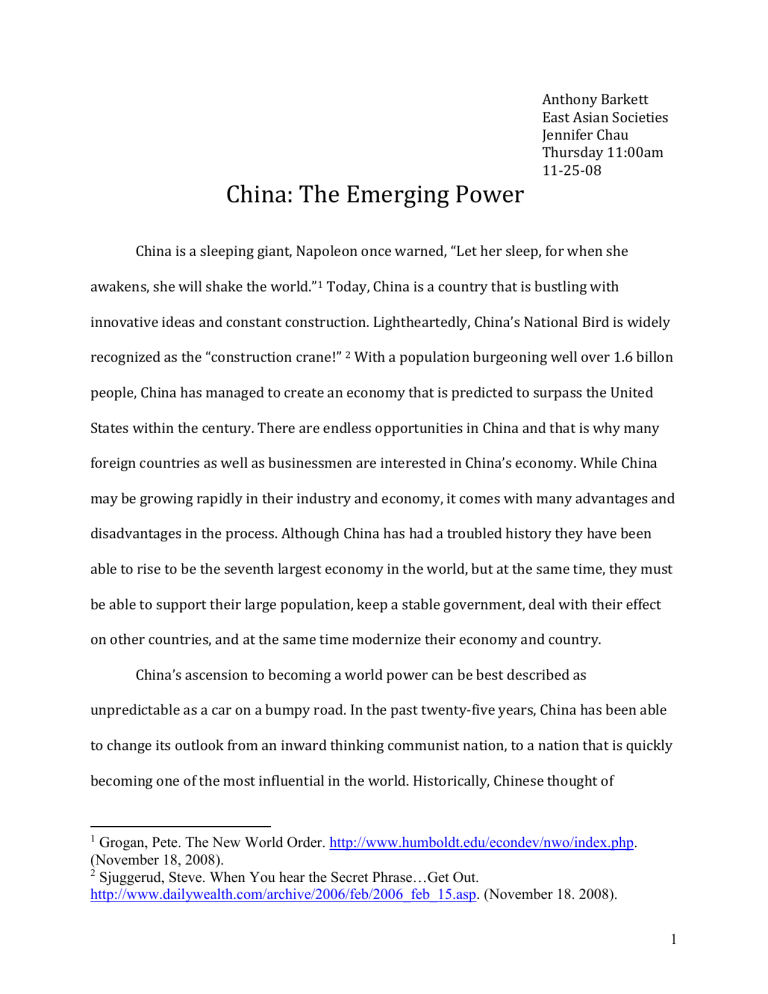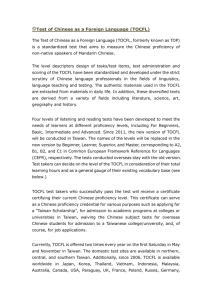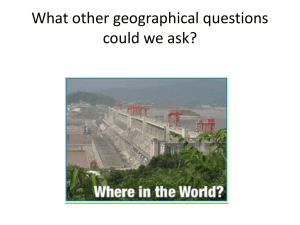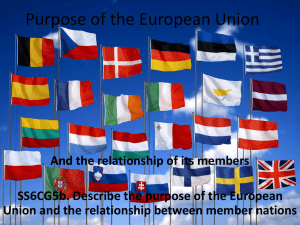China Brief

Anthony Barkett
China: The Emerging Power
East Asian Societies
Jennifer Chau
Thursday 11:00am
11-25-08
China is a sleeping giant, Napoleon once warned, “Let her sleep, for when she awakens, she will shake the world.” 1 Today, China is a country that is bustling with innovative ideas and constant construction. Lightheartedly, China’s National Bird is widely recognized as the “construction crane!” 2 With a population burgeoning well over 1.6 billon people, China has managed to create an economy that is predicted to surpass the United
States within the century. There are endless opportunities in China and that is why many foreign countries as well as businessmen are interested in China’s economy. While China may be growing rapidly in their industry and economy, it comes with many advantages and disadvantages in the process. Although China has had a troubled history they have been able to rise to be the seventh largest economy in the world, but at the same time, they must be able to support their large population, keep a stable government, deal with their effect on other countries, and at the same time modernize their economy and country.
China’s ascension to becoming a world power can be best described as unpredictable as a car on a bumpy road. In the past twenty-five years, China has been able to change its outlook from an inward thinking communist nation, to a nation that is quickly becoming one of the most influential in the world. Historically, Chinese thought of
1
Grogan, Pete. The New World Order. http://www.humboldt.edu/econdev/nwo/index.php
.
(November 18, 2008).
2
Sjuggerud, Steve. When You hear the Secret Phrase…Get Out. http://www.dailywealth.com/archive/2006/feb/2006_feb_15.asp
. (November 18. 2008).
1
themselves as the center of the world and most of the time referred to themselves as
Zhongguo, which means Middle Kingdom. Traditionally, China has had a dislike and fear of foreigners. In the early 1950’s most of the foreigners were actually ordered out of the country. This created China’s isolationist policy. Not until after the Cultural Revolution in
1976 did China begin to slowly open its doors. President Nixon’s first visit to China in 1972 was a big step in implementing China in the foreign market; it became known as “the week that changed the world.” 3
China did not open up reform until 1978 under Deng Xiaoping and averaged a 9.4% increase in annual GDP growth, one of the fastest growing in the world. According to
Ogden, “It accounts for four percent of the world’s economy and has foreign trade worth
$851 billion; the third largest national total in the world.” 4 (Pg.140). China has grown rapidly with the help of billions and trillions of foreign investment. Although these monetary figures sound astounding, China remains one of the lowest-income developing nations, ranking around 100th in the world.
Today, China has a stable government consisting of Mr. Wen Jiabao as Prime
Minister, who is in charge of the government, military and Congress. Many of the mayors of the four big provinces, Shanghai, Beijing, Tianjin and Chongqing, are major players in helping the prime minister and advancing the economy. Not too long ago, the political composition was different. The Communists did not take power until they defeated the
Nationalists in 1949, resulting in the Nationalists fleeing into Taiwan. Even though the
Communists were successful at restoring order and creating a powerful large group of
3
Author Unknown. The Nixon Visit. www.pbs.org/wgbh/amex/china/sfeature/nixon.html
.
(November 18, 2008).
4
Ogden, Suzanne. China: 12 th
edition. Dubuque, Iowa; McGraw Hill and Temporary Learning
Series, 2008, (Pg. 140).
2
supporters, Mao decided to implement a few programs that resulted in the deaths of millions and left hundreds of thousands homeless. These programs included the Great Leap
Forward from 1958-1962 and the Cultural Revolution from 1966-1976. Not until Mao
Zedong died in 1976 and Deng Xiaoping took over did the world see a slight shift of communism to capitalism.
China’s strong sense of nationalism and pride kept them from looking to other nations for advancement in technology and ideas. When Deng Xiaoping took control over
China this all changed; he opened the doors after they had been closed for 30 years. China was far behind the rest of the other countries but now with the new regime and influx of ideas, China was faced with new objectives that were considered intriguing to the people, but were considered illegal in other countries. Such objectives included drug trafficking, counterfeiting, corruption, smuggling, and prostitution. These activities were social evils left over from Old China. In 1997, the Macao legislative Assembly introduced a new law to stop the sex trafficking of women as well as drugs and if caught a person could receive up to 12 years in prison.
5 One and a half million prostitutes and male buyers were arrested between the years of 1991-1995, some girls being as young as thirteen.” While prostitution is still legal in Hong Kong today, there have been many measures such as weekly inspections of dance halls, massage parlors, and villages in order to reduce the amount of prostitution. As China became faced with these ideas, their people began to get smarter and wealthier. This prompted the people of China to urge the government to give them more human rights, which the government was not willing to give them. While the government is trying to keep them happy, it seems impossible for the government to succeed without
5 Author Unknown. Global Sexual Exploitation: China and Hong Kong. http://www.uri.edu/artsci/wms/hughes/china.htm
. (November 18, 2008).
3
giving the people their rights. As sociologist, Ching Kwan Lee said, “As per capita income rises what people want are changes. As they satisfy some basic needs, they shift toward wanting to satisfy an expanding list of desires. Poor people want food and shelter. Rich people turn their attention toward clean air and a greater say in local governance.”
Considering the country’s rapid economic development, there tends to be a collision of politicians to violate citizens’ rights in order to fight for their rights rather than their citizens.
6 However, the issues regarding human rights are far less important and no match to China keeping up with its fast pace flourishing economy.
Today, China begins to face many problems, as their economy becomes one of the largest in the world. These problems are in energy, pollution, infrastructure, roads, power lines, and rivers. Since China is a superpower, everything they do affects other nations.
China has the power to affect smaller countries economies and global investments.
Technology is also one of the main factors that lead to a countries advancement and since
China was slower to react to this than the United States, it caused China to continue to lag behind other countries for its lack of innovation. Ever since China went into isolation during the Ming Dynasty have they been behind in technology. The Ming Dynasty closed their doors when the Industrial Revolution had started in Europe. Any country that did not industrialize fell behind and many European countries were able to surpass China because they industrialized. If China had participated in the first Industrial Revolution, they could have been the most powerful country today. For instance, just before the incident at
Tiananmen Square, China’s technology in mass media had grown substantially and became increasingly liberalized, but afterwards, China again cracked down on any type of freedom
6 Parker, Randall. Chinese Seen as Quietly Fighting for more Rights. http://www.parapundit.com/archives/005363.html
. (November 16, 2008).
4
of press, radio, internet, and television. Today, China has had significant increases in technology, but they still tend to block out some features based on their traditionalist view.
What the United States considers a constitutional right such as freedom of press, China considers this U.S. right as liberated and uncontrolled. Technology and freedom are essential to a country’s advancement; they allow the country to be on the alert and prepared for times of war, economic failure, and natural disasters. China must keep itself up to date in order to be competitive in the world and if China wants to advance, it must have connections and working relationships with other superpowers and allies and less control on their citizens’ privileges.
One challenge that could be a potential danger to China is the long lasting civil war they have had against Taiwan. After Chiang Chi Sheik fled Mainland China, he vowed he would take it back. To this day, that has not happened and China threatens that they will invade Taiwan if they gain freedom. One major problem is the United States has supported
Taiwan since the beginning because the U.S. supports democracy and not communism. The
United States has supported Taiwan both financially and with armaments. On the other hand, China accepts Taiwan as part of its own. If Taiwan is to gain independence, the
United States will be torn between two countries. Most recently, China has canceled a series of military and diplomatic contacts with the United States to protest a multibilliondollar U.S. arms sale to Taiwan. The United States sold Taiwan “a $6.5 billion package of advanced weaponry and military items.” 7 The Chinese government is so furious that they have even cancelled some Chinese politicians from visiting the United States.
7 Author Unknown. China rebuffs United States over Taiwan arms deal. http://www.iht.com/articles/2008/10/07/asia/military.php
. (November 16, 2008).
5
A developmental change that still faces China is pulling their large population out of poverty. With a lack of natural resources in energy, raw materials and water, it is hard to support such a large population. Since China’s economy is growing so fast, they tend to use their natural resources at a faster pace as well. To satisfy the current lifestyle of each person in China, “it runs at 1.6 hectares per person and to keep from running out of their resources, China will either need to double the land and water area it uses or cut back to nearly .8 hectares per person.” 8 China’s construction of the Three Gorges Dam in Chongqing will help China’s problem with their over population. The dam is being built in the largest city in the world with over 35 million people. Not only will it produce tons of electricity, but it will also allow cargo ships to come inland. The construction of the dam will curb China’s dependence on coal, which is one of their most used natural resources and will force them to switch to alternatives such as hydroelectric power. This will also be beneficial because it will help with the current pollution problem in China that has effected/caused cancerous diseases in millions of people in China. In addition, the completion of the dam is hoping to attract more international investment and make Chongqing a major trading city. This is one-step to finding a new source of energy for China because it cannot rely on coal for it will run out of it in the coming years. On the other hand there are many environmental issues that come with building this dam. For instance, the dam will become full of containments and waste due to the “one billion tons of sewage” flowing into the reservoir
8
Author Unknown. China using up natural resources fast. http://www.abc.net.au/news/stories/2008/06/10/2269534.htm?section=justin ..
(November 16, 2008).
6
each year; this will threaten wildlife that depends on the river.
9 So while there may be many positives that come with the construction of the Three Gorges Dam, the Chinese government will soon face many problems with the post effects of the completion of the dam.
As the economy continues to increase, the gap between the rich a poor has a direct relationship. China is home to 1.6 billion people of which seven hundred million live in the rural heartland and nine hundred million live in the wealthy cities. One percent of China’s population moves to the cities each year for opportunities. The government encourages this migration of people into the cities because they want people to move away from the farming and into the future. It has become a difficult task for the government because many families do not want to leave the farmlands because the city is so expensive and it is difficult for families to compete. “At present, China has about 210 million farmer-turnedmigrant workers nationwide who have moved to urban areas in search of a better living.” 10
Still there are many migrant farmers who are hindered by the hukou system, 11 established in the 1950’s it requires migrants to obtain temporary permits after moving into the city and often these permits are hard to obtain. This makes it hard because the government is trying to move rural families into the cities, but many of them cannot afford to move their families to the city. Moving to the city often means a poorer quality of life and inadequate social services, but the city offers much higher wages than the rural areas do.
9
Author Unknown. Three Gorges Case Study. http://www.arch.mcgill.ca/prof/sijpkes/arch374/winter2001/dbiggs/three.html
.
(November 20, 2008).
10
Author Unknown. China vows to strive for balanced rural and urban development. http://www.chinadaily.com.cn/bizchina/2008-10/19/content_7120088.htm
. (November
18, 2008).
11
Chuanjiao, Xie. Study raises questions about hukou. http://www.chinadaily.com.cn/china/2007-04/10/content_846718.htm
. (November 18, 2008).
7
On October 16, 2008, Jim Clifton, President & CEO of the Gallup Poll, spoke to a group of business leaders and USC students who said thirty years ago conventional wisdom told us that Japan would be the leader with a Gross National Product (GNP) of 5 trillion,
Germany would be at 4 trillion, and the United States at 4 trillion. In actuality, 30 years later (today) the U.S. is at a 14 trillion GNP with Japan at 5 trillion and Germany at 4 trillion. Two out of the three predictions were correct. Yet the political structure and competitive markets coupled with a free enterprise system and democracy created an unanticipated boom not only for the U.S. but also for the world. Currently, the conventional wisdom is that 30 years from now China will have a GNP of 40 trillion and India and the
U.S. will have a GNP of 30 trillion each. The question is will the different political systems around the world (one of these mentioned in this paper) enable that to happen? It's incumbent on the current generation of Chinese students to continue that innovation and create products not thought of yet to continue that upward growth as the U.S. did, but they need the freedom to create which under their current government structure will have inherent limitations.
Although China still has a traditional view, China has progressed a lot over the past thirty years. The 2008 Olympics were just held in China, American fast food restaurant chains such as McDonalds, Pizza Hut and Kentucky Fried Chicken can be found all over
China. Even with all of this westernization flowing into China, the communists still control many things. They censor the media such as television and radios, mostly the film industry.
If they continue to censor such things that allow freedom of speech in other countries, it is going to be challenging for China to emerge as the superpower. As Jim Clifton said, it is up to the student population of China to help make China the leading superpower, but the
8
Chinese government must change their political system in order for their people to be free from censorship. At the same time, China’s international relations must improve so they will be able to trade freely with anyone they want. China has the potential to be the most powerful country in the world, but they will be powerless without the help of other countries. China’s emerging economy should be considered a good thing for the world market as a whole.
9
Bibliography
Author Unknown. China rebuffs United States over Taiwan arms deal. http://www.iht.com/articles/2008/10/07/asia/military.php
. (November 16, 2008).
Author Unknown. China using up natural resources fast. http://www.abc.net.au/news/stories/2008/06/10/2269534.htm?section=justin ..
(November 16, 2008).
Author Unknown. China vows to strive for balanced rural and urban development. http://www.chinadaily.com.cn/bizchina/2008-10/19/content_7120088.htm
. (November
18, 2008).
Chuanjiao, Xie. Study raises questions about hukou. http://www.chinadaily.com.cn/china/2007-
04/10/content_846718.htm
. (November 18, 2008).
Author Unknown. Global Sexual Exploitation: China and Hong Kong. http://www.uri.edu/artsci/wms/hughes/china.htm
. (November 18, 2008).
Grogan, Pete. The New World Order. http://www.humboldt.edu/econdev/nwo/index.php
.
(November 18, 2008).
MacDonald, Malcolm. Inside China. Great Britain; Little, Brown and Company, 1983,
Author Unknown. The Nixon Visit. www.pbs.org/wgbh/amex/china/sfeature/nixon.html
.
(November 18, 2008).
Ogden, Suzanne. China: 12 th
edition. Dubuque, Iowa; McGraw Hill and Temporary Learning
Series, 2008, (Pg. 140).
Parker, Randall. Chinese Seen as Quietly Fighting for more Rights. http://www.parapundit.com/archives/005363.html
. (November 16, 2008).
Sjuggerud, Steve. When You hear the Secret Phrase…Get Out. http://www.dailywealth.com/archive/2006/feb/2006_feb_15.asp
. (November 18. 2008).
Terrill, Ross. China In Our Time. New York, New York; Simon and Schuster, 1992, (Pg. 163).
10
Author Unknown. Three Gorges Case Study. http://www.arch.mcgill.ca/prof/sijpkes/arch374/winter2001/dbiggs/three.html
.
(November 20, 2008).
11







